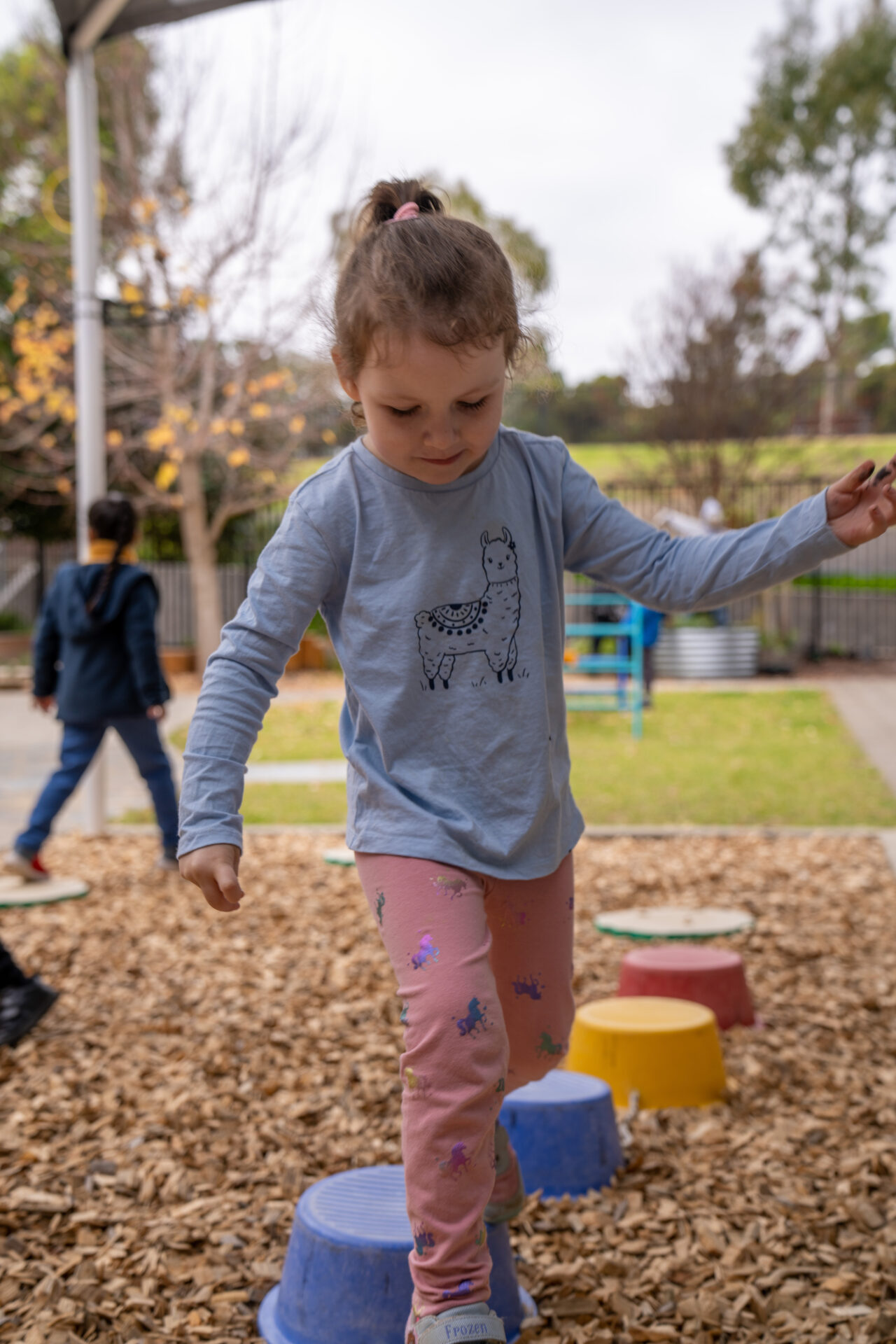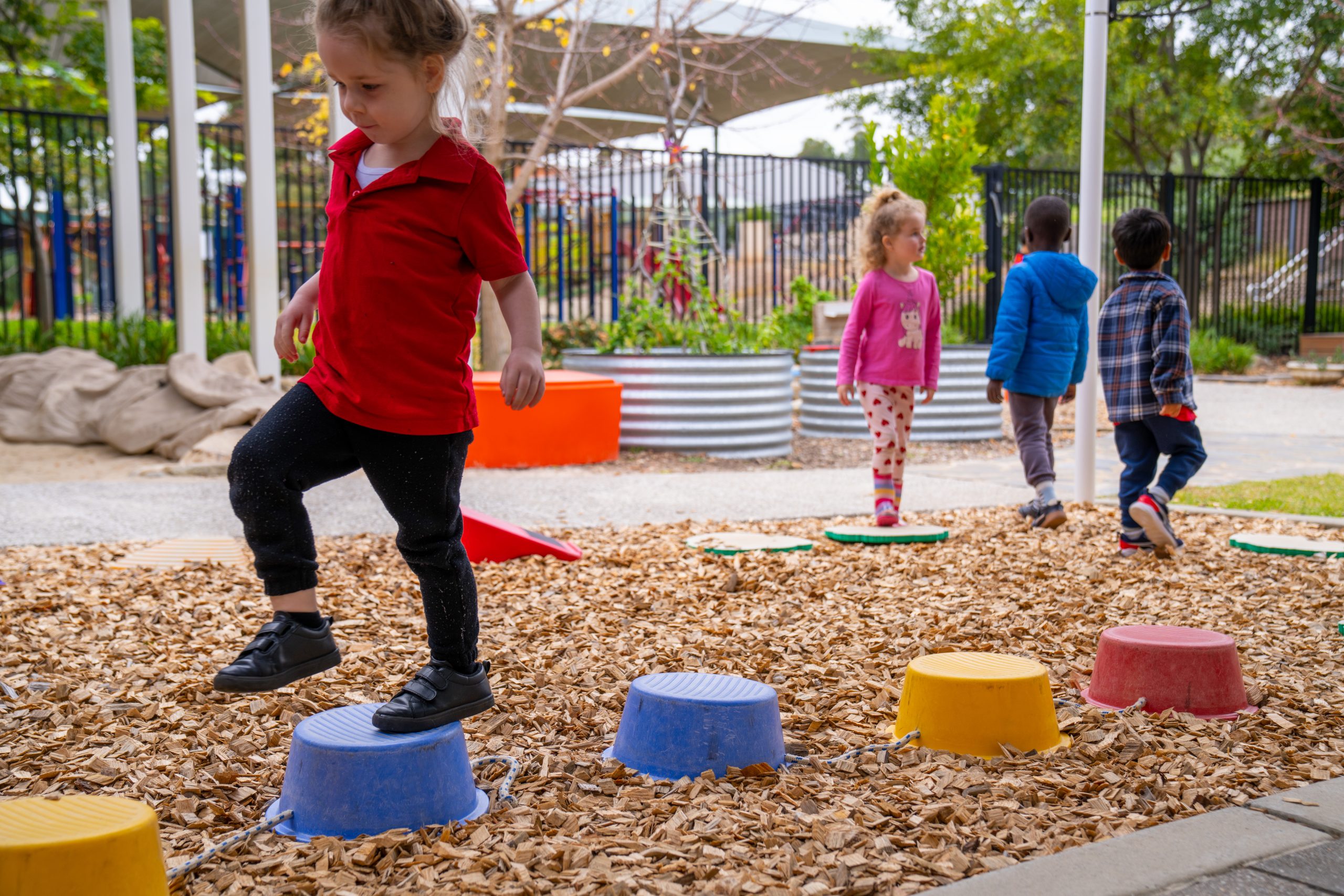Preschool
Our Preschool
Coming to preschool is an important step in your child’s education. At our state-of-the-art preschool, your child will be involved in play-based experiences to encourage and challenge them to develop skills and competencies they will use throughout their whole lives.
Your child will have access to a broad range of experiences which will help them to:
- develop and extend their knowledge and understanding of the world around them
- participate in learning to extend their language and communication skills
- work independently as well as with others and develop their social and emotional maturity
- foster their creativity, thinking and problem-solving skills
- develop positive dispositions to learning
What to Bring Each Day
- A bag that your child can easily manage.
- Hat – broad brimmed or bucket hat style. (no caps)
- Fruit or vegetable snacks – these stay in your child’s bag.
- Lunch – please place your child’s lunch in the…..
- Water bottle (containing water only)
Session Times
By negotiation, you will be offered one of two sessions each week:
Monday and Tuesday
8:30am – 3:10pm
(plus the odd school weeks Wednesday 8:30am – 11:50am)
OR
Thursday and Friday
8:30am – 3:10pm
(plus the even school weeks Wednesday 8:30am – 11:50am)
While we aim to give you your choice of group, we also need to consider child/staff ratios and individual children’s needs. Preschool operates in the same way that schools do with four terms of preschool. On the last day of each term the preschool session finishes earlier at 2pm. Reminders will be sent out to families via our term planner, newsletter and email updates

What to wear
It is important for children to wear clothes that allow freedom of movement around our learning environment, and that they can manage themselves when going to the toilet. Please pack a spare set of clothes in your child’s bag, just in case of accidents. Please name all belongings so items can be easily identified.
Hats: All children and staff are required to wear a hat outside from 1st August to 30th April. Bucket, wide brimmed hat are acceptable as they protect the neck, face and ears.
Footwear: Research and evidence gathered by experts highlight great benefits of barefoot play. Our preschool supports this evidence and children can choose to remove footwear for specific activities. Thongs, shoes with heels and Croc styles are not permitted. To assist your child’s growing independence, footwear that can easily be taken off and put on is essential.
Clothing: As we are a ‘SunSmart’ school, children need to wear clothes that cover their shoulders (i.e. no tank tops, shoe-string straps, etc…). Please ensure all clothing is suitable for outdoor activities such as climbing, swinging, riding. Preschool can be very messy, so clothing that can be easily washed is recommended.
Enrolments
Children are entitled to access 4 terms (1 year) of government preschool in the year before they start school. From 2023 Department for Education are introducing a mid-year intake into preschool. This means children who turn 4 years old:
- before 1 May are eligible to start preschool at the beginning of the year.
- on 1 May to 31 October can commence preschool through the mid-year intake at the start of term 3 of that year
- after 31 October will be eligible to commence preschool at the start of the following year.
Regardless of whether your child starts at the beginning of the year, or through a mid-year intake they will undertake 4 terms of preschool.
Some 3 year olds are eligible to attend preschool, for details see:
http://www.sa.gov.au/topics/education-skills-and-learning/early-childhood-education-and-care/preschool-and-kindergarten
Children are eligible to access 15 hours of preschool per week.
We welcome any enquiries and offer tours of the preschool and school on request. Please contact the school front office to organise these.
Fees
As a Department for Education preschool we receive funds and grants to pay teaching salaries and manage the operation of the preschool, however it doesn’t cover all our costs. A contribution for each child is payable each term. This is used to cover costs associated with the preschool learning program.
You will receive an invoice at the beginning of each term and they are due for payment by the end of Week 4 of that term, unless otherwise negotiated. Payments can be made in cash, Visa or Mastercard at the school front office. Payments can be made on the QKR app.
School Visits
As we are located on the school campus, Para Hills Preschool children regularly access our school resources and experiences including the STEM Rooms, Resource Centre, special events and specialist equipment and services. Preschool children attend assemblies and participate in regular singing sessions and Digital Technologies lessons with the Junior Primary classes. These sessions help the children become familiar and confident with the school setting.
There are four formal transition visits to PHS classes towards the end of term 4. Where possible, children are placed with their class teacher for the following year. Children with special needs can have additional transition visits if required.
Attendance
We strongly encourage children to attend all allocated sessions each week to gain the maximum benefit from their preschool year. Regular attendance at preschool enables children to make and sustain friendships as well as setting good attendance patterns that will carry over into school. Staffing and Government Grants depend on regular attendance and enrolment numbers. If your child is absent, please phone to let the preschool teachers know.
Toileting Procedures
One of our goals at preschool is for children to be independent in managing their own hygiene needs and as such we encourage children to go to the toilet independently. However, at times accidents do occur. In such instances, educators will support your child to independently clean and change themselves into their own clothes if available or the preschool has spare clothes if needed.
At all times your child will be treated with dignity and respect for their privacy and wellbeing. If your child has recurring toileting difficulties, they may benefit from a continence care plan. If you would like to discuss this procedure or find out more about continence care plans, please discuss with a staff member.
Curriculum
The learning program at Para Hills Preschool is based on the ‘Belonging, Being and Becoming – The Early Years Learning Framework’. Within This Framework, there are five learning outcomes, designed to capture the integrated and complex learning development of children
These outcomes are:
Outcome 1: Children have a strong sense of identity… ‘I am who I am’ – When children feel respected for who they are and have safe, supportive relationships they become motivated and successful learners.
Outcome 2: Children are connected with and contribute to their world… ‘I am a great friend’ – Learning is cooperative – we learn from each other and with each other in a variety of environments. We want children to respect and be actively engaged in play situations and exploring their world.
Outcome 3: Children have a strong sense of wellbeing… ‘I am independent’. Wellbeing involves children’s emotional and physical wellbeing. For children to build a solid emotional wellbeing, they need to be resilient. A strong sense of wellbeing allows children to take risks, make mistakes and be able to think for themselves. Physical wellbeing encompasses the physical skills needed to be able to learn and the ability to take responsibility for managing their own health, hygiene and safety.
Outcome 4: Children are confident and involved learners… ‘I am curious, inquisitive and eager to learn’ – Learning is about taking a risk, investigating, experimenting, problem solving and discovering something new. To take risks, children need to feel confident in themselves and secure in their environment. When children feel confident, they develop positive attitudes to learning, take responsibility, rise to the challenge and extend their thinking and knowledge.
Outcome 5: Children are effective communicators… ‘I can express myself’ – Communication is central to all learning. To effectively communicate how they feel and what they think, children need to be engaged in and practise all forms of communication.
We use the Early Years Learning Framework to provide an environment which develops knowledge, skills and attitudes through structured and unstructured activities that meet individual needs. Staff program on a fortnightly basis – usually with a specific focus or interest.
Numeracy & Literacy
Numeracy and Literacy are essential life skills that begin to develop from birth and continue to develop throughout our lives. The Early Years Learning Framework describes Numeracy and Literacy as;
Numeracy is the capacity, confidence and disposition to use mathematics in daily life.
Children develop mathematical understandings through engaging with problem solving. Educators support children to develop a rich mathematical vocabulary to accurately describe and explain mathematical ideas and to support numeracy development. Spatial sense, structure and pattern, number, measurement, data, and exploring the world mathematically are the mathematical ideas children need to become numerate.
Literacy is the capacity, confidence and disposition to use language in all its forms.
Literacy incorporates a range of communication including music, movement, dance, storytelling, visual arts, media and drama, as well as talking, listening, viewing, reading and writing. Contemporary texts include electronic and print based media. In an increasingly technological world, the ability to critically analyse texts is a key component of literacy. Children benefit from opportunities to explore their world using technologies and to develop confidence in using digital media.


